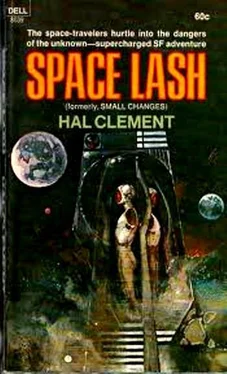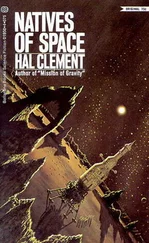Hal Clement - Space Lash
Здесь есть возможность читать онлайн «Hal Clement - Space Lash» весь текст электронной книги совершенно бесплатно (целиком полную версию без сокращений). В некоторых случаях можно слушать аудио, скачать через торрент в формате fb2 и присутствует краткое содержание. Год выпуска: 1969, Жанр: Фантастика и фэнтези, на английском языке. Описание произведения, (предисловие) а так же отзывы посетителей доступны на портале библиотеки ЛибКат.
- Название:Space Lash
- Автор:
- Жанр:
- Год:1969
- ISBN:нет данных
- Рейтинг книги:3 / 5. Голосов: 1
-
Избранное:Добавить в избранное
- Отзывы:
-
Ваша оценка:
- 60
- 1
- 2
- 3
- 4
- 5
Space Lash: краткое содержание, описание и аннотация
Предлагаем к чтению аннотацию, описание, краткое содержание или предисловие (зависит от того, что написал сам автор книги «Space Lash»). Если вы не нашли необходимую информацию о книге — напишите в комментариях, мы постараемся отыскать её.
Space Lash — читать онлайн бесплатно полную книгу (весь текст) целиком
Ниже представлен текст книги, разбитый по страницам. Система сохранения места последней прочитанной страницы, позволяет с удобством читать онлайн бесплатно книгу «Space Lash», без необходимости каждый раз заново искать на чём Вы остановились. Поставьте закладку, и сможете в любой момент перейти на страницу, на которой закончили чтение.
Интервал:
Закладка:
It was quite a job. The zeowhale was still slippery, since the magnets had not come even close to removing all the foreign growth. When the boy tried to reach around it to fasten the straps it slithered away from him. He called for more slack and tried to pin it against one of the hulls as he worked, but still it escaped him. He was too stubborn to ask for help, and by this time Farrell was laughing too hard to have provided much anyway.
“Ride him, Buster!” the chief diver called as Stubbs finally managed to scissor the slippery cylinder with his legs. “That's it…you've got him dogged now!”
The boy hadn't quite finished, actually, but one strap did seem secure around the forward part of the hull. “Take up slack!” he called up to the hatch, without answering Farrell's remark.
Dandridge had been looking through the trap and could see what was needed; he reached to his control console and the hoist cable tightened.
“That's enough!” called Stubbs as the nose of the zeowhale began to lift from the water. “Hold it until I get another strap on, or this one will slip free!”
Winches obediently ceased purring. With its motion restrained somewhat, the little machine offered less opposition to the attachment of a second band near its stern. The young swimmer called, somewhat breathlessly, “Take it up!” and paddled himself slowly back to the ladder. Farrell gave him a hand up, and they reached the deck almost as quickly as the specimen.
Dandridge closed the hatch without waiting for orders, though he left the ladder down — there would be other pickups in the next few minutes, but the wind was cold and loud. Stubbs paid no attention; he barely heard the soft “Eight hundred meters, seventy-five mils to starboard,” as he made his way around the closing hatch to Mancini's work station. The mechanic's job was much more fascinating than the pilot's.
He knew better than to interrupt a busy professional with questions, but the mechanic didn't need any. Like several other men, not only on the Shark but among the crew of her mother ship, Mancini had come to like the youngster and respect his general competence; and like most professionals, his attitude toward an intelligent labor draftee was a desire to recruit him before someone else did. The man, therefore, began to talk as soon as he noticed the boys presence.
“You know much about either chemical or field analysis, Rick?”
“A little. I can recognize most of your gear — ultracentrifuge, chromatographic and electrophoretic stuff, NMR equipment, and so on. Is that,” he pointed to a cylindrical machine on another bench, “a diffraction camera?”
“Good guess. It's a hybrid that a friend of mine dreamed up which can be used either for electron microphotography or diffraction work. All that comes a bit later, though. One thing about analysis hasn't changed since the beginning; you try to get your initial sample into as many different homogeneous parts as possible before you get down to the molecular scale.”
“So each of these little tubes you're filling goes through centrifuge, or solvation, or electrophoresis…"
“More usually, through all of them, in different orders.”
“I should think that just looking at the original, undamaged specimen would tell you something. Don't you ever do that?”
“Sure. The good old light microscope will never disappear; as you imply, it's helpful to see a machine in its assembled state, too. I'll have some slides in a few more seconds; the mike is in that cabinet. Slide it out, will you?”
Stubbs obeyed, literally since the instrument was mounted on a track. The designers of the Shark's laboratory had made it as immune to rough weather as they could. Mancini took the first of his slides, clipped it under the objective, and took one look.
“Thought so,” he grunted. “Here, see for yourself.”
Stubbs applied an eye to the instrument, played briefly with the fine focus — he had the normal basic training in fundamental apparatus — and looked for several seconds.
“Just a mess of living cells that don't mean much to me, and a lot of little octahedra. Are they what you mean?”
“Yep. Magnetite crystals, or I'm a draft-dodger.” (His remark had no military significance; the term now referred to individuals who declined the unskilled-labor draft, voluntarily giving up their rights to higher education and, in effect, committing themselves to living on basic relief.) “We'll make sure, though.” The mechanic slid another piece of equipment into position on the microscope stage, and peered once more into the field of view. Stubbs recognized a micromanipulator, and was not surprised when Mancini, after two minutes or so of silent work, straightened up and removed a small strip of metal from it. Presumably one of the tiny crystals was now mounted on the strip.
The mechanic turned to the diffraction camera, mounted the bit of metal in a clamp attached to it, and touched a button which started specimen and strip on a journey into the camera's interior. Moments later a pump started to whine.
“Five minutes to vacuum, five more for scanning,” he remarked. “We might as well have a look at the fish itself while we wait; even naked-eye examination has its uses.” He got up from his seat, stretched, and turned to the bench on which the ruined zeowhale lay. “How much do you know about these things, Rick? Can you recognize this type?”
“I think so. I'd say it was a copper-feeder of about '35 model. This one would be about two years old.”
“Good. I'd say you were about right. You've been doing some reading, I take it.”
“Some. And the Guppy's shop is a pretty good museum.”
“True enough. Do you know where the access regions are on this model?”
“I've seen some of them opened up, but I wouldn't feel sure enough to do it myself.”
“It probably wouldn't matter if you did it wrong in this case; this one is safely dead. Still, I'll show you; better see it right than do it wrong.” He had removed the straps of the sling once the “fish” had been lowered onto a rack on the bench, so nothing interfered with the demonstration. “Here,” he pointed, “the reference is the centerline of scales along the back, just a little lighter in color than the rest. Start at the intake ring and count eight scales back; then down six on either side, like that. That puts you on this scale…so…which you can get under with a scalpel at the start of the main opening.” He picked up an instrument about the size of a surgical scalpel, but with a blunt, rounded blade. This he inserted under the indicated scale. “See, it comes apart here with very light pressure, and you can run the cut back to just in front of the exhaust vents — like that. If this were a living specimen, the cut would heal under sealant spray in about an hour after the fish was back in the water. This one… hm-m-m. No wonder it passed out. I wonder what this stuff is?”
The body cavity of the zeowhale was filled with a dead-black jelly, quite different in appearance from the growth which had covered the skin. The mechanic applied retractors to the incision, and began silently poking into the material with a variety of “surgical” tools. He seemed indifferent to the feelings which were tending to bring Stubbs' stomach almost as much into daylight as that of the whale.
Pieces of rubbery internal machinery began to litter the bench top. Another set of tiny test tubes took samples of the black jelly, and followed their predecessors into the automatic analyzers. These began to hum and sputter as they went to work on the new material — they had long since finished with the first load, and a pile of diagrams and numerical tables awaited Mancini's attention in their various delivery baskets. He had not even taken time to see whether his guess about magnetite had been good.
Читать дальшеИнтервал:
Закладка:
Похожие книги на «Space Lash»
Представляем Вашему вниманию похожие книги на «Space Lash» списком для выбора. Мы отобрали схожую по названию и смыслу литературу в надежде предоставить читателям больше вариантов отыскать новые, интересные, ещё непрочитанные произведения.
Обсуждение, отзывы о книге «Space Lash» и просто собственные мнения читателей. Оставьте ваши комментарии, напишите, что Вы думаете о произведении, его смысле или главных героях. Укажите что конкретно понравилось, а что нет, и почему Вы так считаете.












